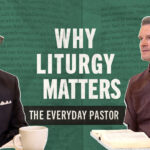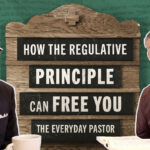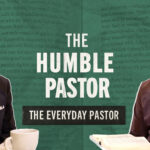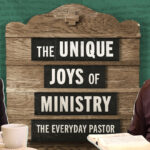On My Shelf helps you get to know various writers through a behind-the-scenes glimpse into their lives as readers.
I spoke with blogger and author Alastair Roberts about what’s on his nightstand, books he re-reads, what he’s learning, and more.
What’s on your nightstand right now?
- C. S. Lewis’s The Four Loves, which I’m re-reading in preparation for a series of Mere Fidelity podcasts. Lewis is always such a delight to read.
- Reverberations of the Exodus in Scripture, edited by R. Michael Fox, which I’m revisiting for research on a possible future book project.
- Robert Tombs’s The English and Their History, which is quite possibly the best book I’ve read on the subject so far, even if he doesn’t say enough about the North part of the country.
- Durham Cathedral: History, Fabric, and Culture, edited by David Brown, which is a glorious and beautiful doorstopper of a book with a wealth of scholarly articles on every aspect of the cathedral. Durham Cathedral is one of the most spectacular and remarkable buildings in the whole of England. I’m a volunteer in the wonderful new Open Treasure exhibition at the cathedral and want to find out all I can about the place.
- I dip into several other books from time to time, but these are the ones I’m principally reading right now.
What are some books you regularly re-read and why?

I seldom re-read books from cover to cover, although I frequently revisit books. Books I most commonly refer to include:
- Herman Bavinck’s Reformed Dogmatics. I’ve benefited immensely from Bavinck’s theological insight and the care with which he frames things. Almost every time I consult Bavinck I come away informed and enriched in a manner that challenges my instinctive and often unhealthy wariness of systematic theologians!
- N. T. Wright’s Christian Origins and the Question of God series. Wright’s volumes have been exceedingly important interlocutors for me over the years. While I have many more disagreements with him nowadays, his vision of New Testament theology remains my primary conversation partner as I develop my own thinking on the subject.
- James Jordan’s Through New Eyes. More than any other single figure, Jordan shaped the way I read Scripture, making me much more attentive and alert to its poetry and symbolism. While I’m often unpersuaded by his readings of particular texts, over a decade and a half since I first read it, Through New Eyes still pushes me to discover the wonder, depth, intricacy, and beauty of God’s Word.
- Louis-Marie Chauvet’s Symbol and Sacrament. The one issue that, perhaps more than any other, has occupied my thoughts over the past decade is the relationship between Scripture and sacrament. Practically every other issue I’ve studied or written on has somehow involved this underlying question. I have an evangelical’s passion for Scripture. I fear that as evangelicals, however, our doctrine of Scripture is far too small and restrictive, failing to capture the true wonder and power of this Word and how profoundly it lays hold of God’s people. In thinking about this subject I’ve continually been brought back to the connection between the typological or (trans)figural structure and reading of Scripture, and the interplay between the Scripture and the sacramental practice of the church. Louis-Marie Chauvet, a French Catholic theologian, has similar questions at the heart of his seminal work on the sacraments. Despite having significant differences with him, I haven’t found any conversation partner quite so brilliant in framing and exploring the questions of the practical integration and interrelation of all the elements of Christian formation and practice.
What book outside the Bible has most shaped your understanding of sexuality?
Roger Scruton’s Sexual Desire is one of the most helpful books on this subject. Although it’s a philosophical rather than theological or biblical work, Scruton brings perception and clarity to a subject all too commonly characterized by willful obfuscation and distortion.
What biographies or autobiographies have most influenced you and why?
In my late teens, during a period when I was turning away from Christ, I read about the lives of some of the early Methodist preachers, and it had a transformative effect on me. Their love and passion for Christ exposed the hardness of my own heart and over time proved the contagion that was the start of its cure.
Which book do you wish every evangelical Christian would read and why? 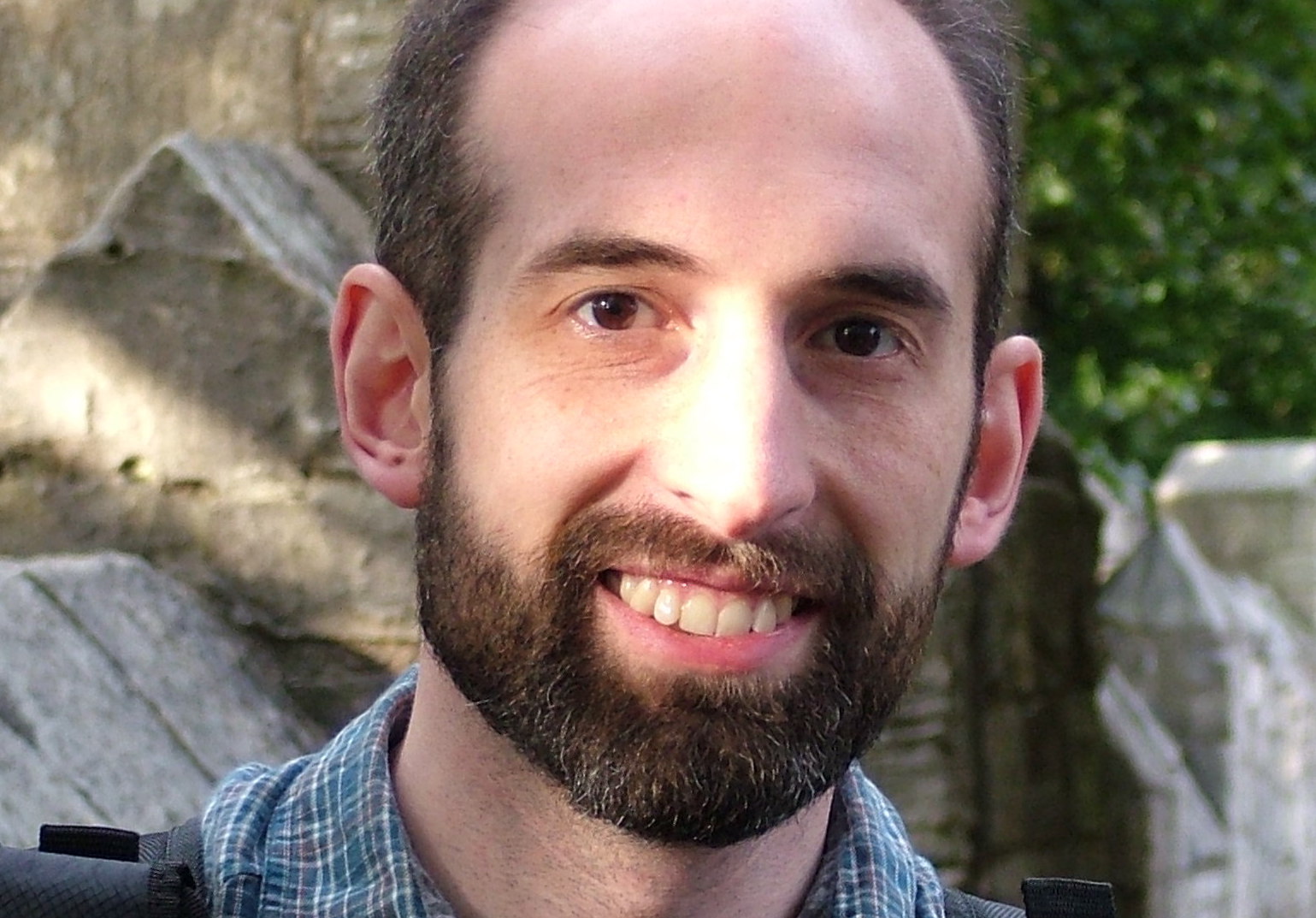
Probably something such as Peter Leithart’s A House for My Name: A Survey of the Old Testament. So many evangelicals don’t know what to do with the Old Testament, and they’re missing out on so much! Leithart’s Deep Exegesis is also a book I’ve recommended to a number of people over the last few years. As with Jordan’s Through New Eyes, I have some reservations with the way certain things are framed. However, there are few books I know of that can do so much to alert people to and excite them about the richness of Scripture.
What are you learning about life and following Jesus?
Right now, perhaps more than anything else, I’m learning the great need for wisdom and the spiritual challenge of pursuing it. There was a time when I instinctively would have associated wisdom more with the mastery of the brain, yet I’m appreciating more why Proverbs places such emphasis on wisdom’s mastery of the heart.
In terms of following Jesus, the reality that’s grasped me more than any other over the past year or so is the depth of Jesus’s claim on my body (something I explored theologically a few months ago here, here, and here). Although I knew this all theoretically, it has struck me practically in a way it never did before, altering the way I understand and experience my body. Christ has grasped me by the bodily roots of my being and declared me his own. My body has been marked out for future resurrection.
We tend to declare the truths associated with this work primarily as the backdrop for discussions of what we shouldn’t do with our bodies. However, we would benefit so much from bringing these truths to the foreground of our consciousness and discovering the profundity of their positive import. Christian truth is so often proclaimed as if it were addressed only to our minds. Yet our physical bodies are reservoirs for some of our deepest guilt, shame, weakness, woundedness, insufficiency, insecurity, anxiety, fear, isolation, sense of rejection, and purposelessness—realities not often properly addressed in our churches. We can often treat the sacraments as if they were clumsy ways God seeks to communicate ideas to dull minds, as representations of ideas we should hold, which must be translated back into their appropriate conceptual form. I think we miss the ways God is more directly addressing his healing truth to our bodies.
Also in the On My Shelf series: Scott Sauls, Karen Swallow Prior, Jackie Hill Perry, Bruce Ashford, Jonathan Leeman, Megan Hill, Marvin Olasky, David Wells, John Frame, Rod Dreher, James K. A. Smith, Randy Alcorn, Tom Schreiner, Trillia Newbell, Jen Wilkin, Joe Carter, Timothy George, Tim Keller, Bryan Chapell, Lauren Chandler, Mike Cosper, Russell Moore, Jared Wilson, Kathy Keller, J. D. Greear, Kevin DeYoung, Kathleen Nielson, Thabiti Anyabwile, Elyse Fitzpatrick, Collin Hansen, Fred Sanders, Rosaria Butterfield, Nancy Guthrie, and Matt Chandler.
Browse dozens of book recommendations from The Gospel Coalition’s leaders and sign up your church at Hubworthy.
Involved in Women’s Ministry? Add This to Your Discipleship Toolkit
 We need one another. Yet we don’t always know how to develop deep relationships to help us grow in the Christian life. Younger believers benefit from the guidance and wisdom of more mature saints as their faith deepens. But too often, potential mentors lack clarity and training on how to engage in discipling those they can influence.
We need one another. Yet we don’t always know how to develop deep relationships to help us grow in the Christian life. Younger believers benefit from the guidance and wisdom of more mature saints as their faith deepens. But too often, potential mentors lack clarity and training on how to engage in discipling those they can influence.
Whether you’re longing to find a spiritual mentor or hoping to serve as a guide for someone else, we have a FREE resource to encourage and equip you. In Growing Together: Taking Mentoring Beyond Small Talk and Prayer Requests, Melissa Kruger, TGC’s vice president of discipleship programming, offers encouraging lessons to guide conversations that promote spiritual growth in both the mentee and mentor.








